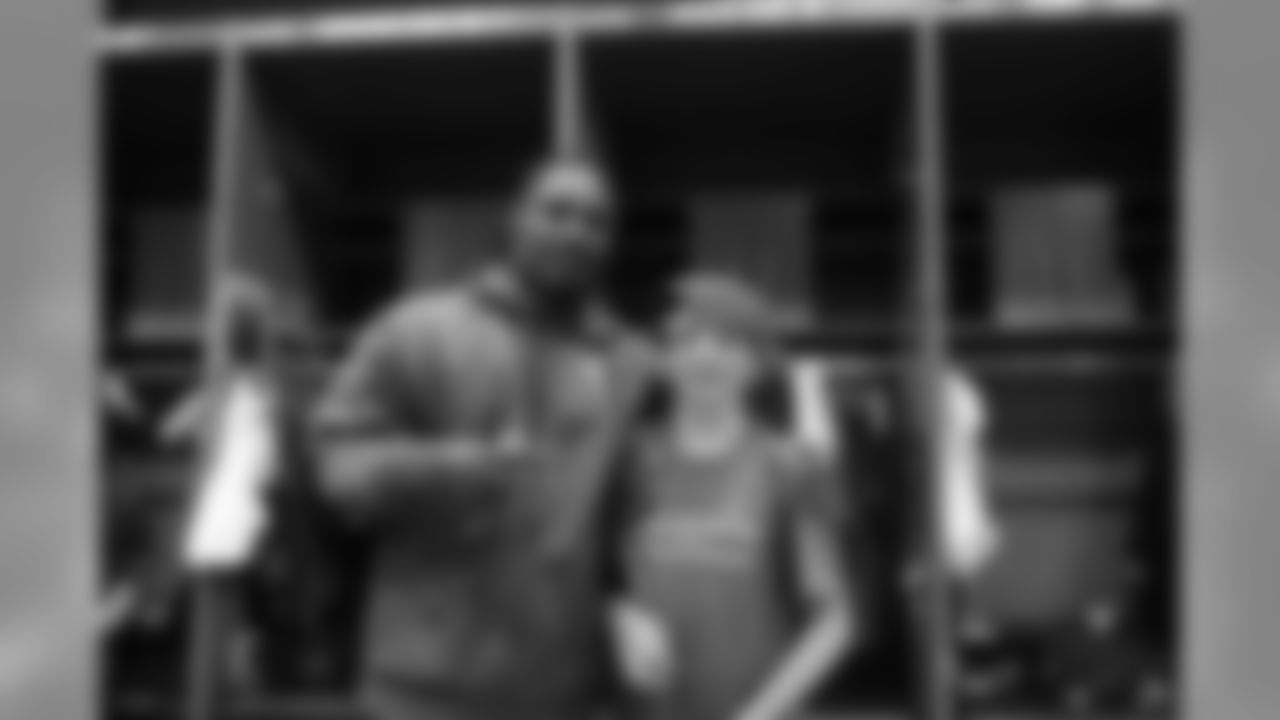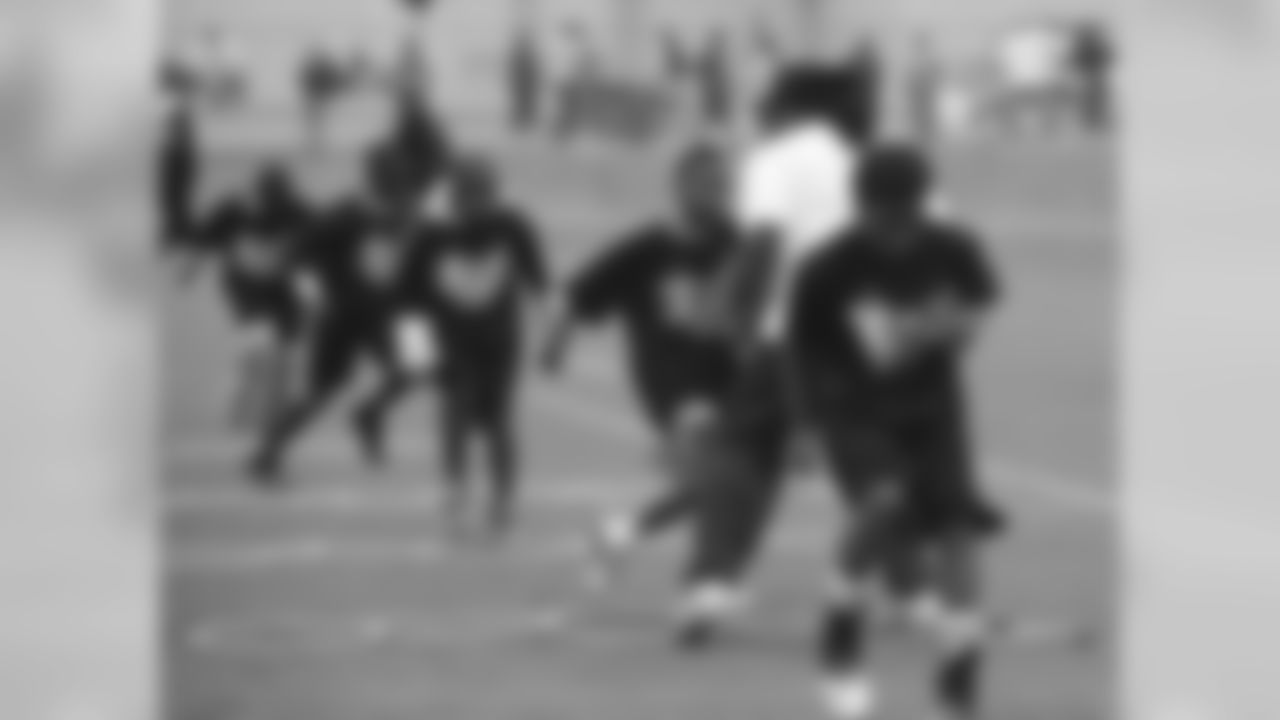Marshawn Lynch announced himself to Seahawks fans with an earth-shaking run in the playoffs. He exited with a single photo posted on Twitter five years later.
In between, a "Beast Quake" and an apparent retirement announcement during Super Bowl 50, Lynch became not just one of the league's most feared running backs, but also one of the most iconic athletes in Seattle sports history.
Lynch won't go down as the greatest player in Seahawks history, not over first-ballot Hall of Famers like Steve Largent and Walter Jones, but what Lynch unquestionably was during his six seasons in Seattle was one of the most important players in franchise history, particularly in light of the team's success over the past four seasons.
"He's not carrying the football, he's carrying his team," offensive line coach/assistant head coach Tom Cable said last year. "That's who he is. That's what he does."
The ferocious style with which he ran, the swagger with which he finished big plays, the respect he had in Seattle's locker room, all of that helped define the style of the Pete Carroll/John Schneider-era Seahawks. When Schneider and Carroll added Lynch in a midseason trade with Buffalo during their first year in Seattle, they didn't just do it to add a ball carrier, they wanted to add attitude and toughness that to that point had been lacking.
"I don't know if anything is more symbolic than what we've done with Marshawn and him playing the way he's played and him being the guy he is," Carroll said late in the 2012 season that was the best of Lynch's career. "I think he really is the key element to putting this thing together from the attitude perspective at least."
A franchise-altering trade that almost didn't happen
Before Lynch could become the identity of Seattle's offense, the team's "heart and soul," as receiver Doug Baldwin has described him, the Seahawks first had to acquire him from Buffalo. Carroll, who had coached against Lynch in college, was a big fan of the back, and he wanted to add Lynch to his team before the 2010 season. Buffalo said no to early trade proposals, and only gave in after a lot of persistence from Schneider.
"We went after him for a long time, and I just kept bugging John and bugging John," Carroll said in 2012. "I mean it was eight or nine weeks or something, whenever we got him, we had been on it through the offseason and all of that. John probably called them back 10 times to get this done. ... There were a number of times when John would look at me and say 'Look, I just called them last week,' and I'd say, 'Oh, come on, let's try again. You never know.'
"We were very persistent about it and finally the opportunity arose for us. This is what we had hoped. We had hoped that he would be a big-timer and that we would make him fit in and feel comfortable and like his surroundings, and really contribute in a big way."
Buffalo eventually relented—"I think John just wore them out," Carroll joked. "I think that he wore them down after a while"—and for the bargain price of a 2011 fourth-round pick and a 2012 fifth-rounder, the Seahawks pulled off what ended up being one of the best trades in franchise history.
In Lynch's first season, Seattle was still finding its way on offense and he never eclipsed 100 yards that year. At least not in the regular season. In Lynch's first career playoff game, Matt Hasselbeck was the star for much of the day, outdueling Drew Brees in a Seahawks upset victory over the defending Super Bowl champion Saints, but Lynch helped put the game away with a 67-yard touchdown run that is now considered one of the great runs in NFL history. While breaking tackle after tackle and introducing Seahawks fans to the phenomenon known as "Beast Mode," Lynch worked the crowd into such a frenzy that seismic activity was recorded in the area.
The next season, Lynch and the running game would become the offense's focal point midway through the season, and after not having a 100-yard game in his first 18 regular-season games with Seattle, he had six over the next eight weeks, with Seattle winning five of their final eight games to close the season. The Seahawks didn't make the playoffs in 2011, but that decision to commit the running game has frequently been pointed to by Cable and Seahawks players as a turning point for a team that made the playoffs four straight years since, including two trips to the Super Bowl.
Injuries limited Lynch this season, but from 2011 to 2014, he rushed for 5,357 yards and 48 touchdowns, and had a huge hand in getting the Seahawks to consecutive Super Bowls, winning Super Bowl XLVIII 43-8 over Denver. And as was evident early on in his "Beast Quake" run, Lynch was at his best in big games, rushing for 937 yards and nine touchdowns in 11 postseason games, including six games over 100-yards, a total only eclipsed by Emmitt Smith and Terrell Davis, who each had seven.
"Honestly, this is exactly what I had hoped for," Carroll said of the Lynch trade two years ago. "I hoped it would turn on out like this. I hoped that he would get a new lease on life, we would get the benefit of him jumping into a situation where he was going to be appreciated and understood and utilized, and I just hoped that it would turn out like this.
"Now, I can't tell you I thought it was going to be three years of a thousand yards and 10-plus touchdowns or whatever the heck it is. I didn't know that. I think the really exciting part of it is how he's responded to the opportunity. He has maxed it out and he has captured us, really our club, with his leadership and his toughness and his style of play."
A player who's style "epitomizes what we want to be about."
To look at Lynch's impressive statistics only begins to touch on what he meant to the Seahawks over the past six years. Lynch was an immensely gifted back, one whose talents were sometimes overshadowed by his determination. Often lost amidst the many highlights of Lynch running through would-be tacklers was just how quick and elusive he was as well—Carroll once described Lynch as having the feet of a slalom skier.
But what made Lynch so important to the Seahawks wasn't just that physical ability, but rather the edge with which he played the game. Lynch didn't just gain extra yards with that effort; he elevated a team.
"His running style definitely epitomizes what we want to be about in this program: aggressiveness, straining, all those type of things," former fullback Michael Robinson once said of Lynch. "Definitely when we see him getting going, it's a boost to the team.
"It just jumps off the tape. Teams know when they play against us, they have to deal with '24.' That's just the way it's set up. Watching him run, he makes you want to strain, he makes you want to go harder. He's just a great symbol for what this team is trying to stand for."
Or as former Seahawks center Max Unger put it: "He makes us play harder, too, knowing that he's going to break a couple of tackles. And if we can get up there and get some people off him, he'll go for extra yards."
When the Seahawks were preparing for a second straight Super Bowl last year, players had a goal of making Lynch the MVP of the game. They didn't want that for Lynch because they liked him, though they did—few players, if any, were more universally loved and respected in Seattle's locker room—but rather because they knew that if Lynch had a big game, it would almost certainly mean good things for the team.
"We know the formula that we have put in place is if Marshawn wins the MVP then we have done our job on offense," Baldwin said last year before the Super Bowl. "He means everything to this offense. I don't know where we would be without Marshawn Lynch. He is the engine. He is the heart and soul of this offense. Everything runs through him. Despite what everyone wants to think, Marshawn Lynch is this offense. I don't know what else to say about that."
Because he famously avoided the media, particularly in later part of his career, his personality wasn't always well known to those outside of the team and his inner circle, but within the Seahawks locker room, few players were more respected.
"He just cares about everybody," Unger said last year. "He could sit down with every single dude in the locker room and have a conversation with him, and it would be genuine. He has a relationship with pretty much everybody that's close enough where he could sit down and have a 20-minute conversation with them and not bat an eye."
Lynch was also known as one of the smartest players on the team, something Cable brought up on multiple occasions.
"I think if you asked every player in this room right now to talk about the other 21 positions in football," Cable said at last year's Super Bowl media day. "I don't know if you could find many that could do that. I think he's extraordinary that way, he gets it."
The Beast was also a comedian
While Lynch was best known for his toughness, he also had a goofy side that endeared him to teammates, and on the occasions he showed it publicly, to fans as well.
"He's a comedian, man," said Ravens running back Justin Forsett, one of Lynch's closest friends and a former teammate both at Cal and with the Seahawks. "He's always joking. It's very rare to see him serious at any moment unless he's in front of a mic with the media wanting to talk to him. He's just a fun-loving guy."
From appearances on Conan O'Brien's late-night show to hilarious basketball trash talk in the locker room with Forsett and Mike Williams (sorry, this one's not remotely appropriate for retelling here) to asking Charlie Whitehurst, mid interview, if USA Today writer Jon Saraceno was his pops, Lynch has long had a goofball side to him when he chooses to let it out.
Yet those moments only came on Lynch's own terms, and there was also the defiant side of him that refused media interviews, then found a way to beat the system, so to speak, at the Super Bowl by repeating phrases such as "I'm just here so I won't get fined." From the funny man to the defiant one, Lynch wasn't always easy to figure out, but that was all part of what made him the unique athlete that he was.
"Marshawn's extremely intelligent," Unger said while Lynch was surrounded by reporters a few days before last year's Super Bowl. "A lot of people say a lot of bad stuff, but Marshawn is perfectly capable of conducting himself how he wants to. This is his show, and he understands what he's doing. He's aware of everybody's perception of him, but I just don't think he cares."
After nine years in the NFL, Marshawn Lynch not only made an impact on the field but also off the field in the Seattle community and in his hometown of Oakland, Calif.
















at Oakland Technical High School in Oakland, Calif., on Saturday, July 12, 2014. (Godofredo Vasquez/SFBay)

at Oakland Technical High School in Oakland, Calif., on Saturday, July 12, 2014. (Godofredo Vasquez/SFBay)

at Oakland Technical High School in Oakland, Calif., on Saturday, July 12, 2014. (Godofredo Vasquez/SFBay)

at Oakland Technical High School in Oakland, Calif., on Saturday, July 12, 2014. (Godofredo Vasquez/SFBay)

at Oakland Technical High School in Oakland, Calif., on Saturday, July 12, 2014. (Godofredo Vasquez/SFBay)

at Oakland Technical High School in Oakland, Calif., on Saturday, July 12, 2014. (Godofredo Vasquez/SFBay)

at Oakland Technical High School in Oakland, Calif., on Saturday, July 12, 2014. (Godofredo Vasquez/SFBay)

at Oakland Technical High School in Oakland, Calif., on Saturday, July 12, 2014. (Godofredo Vasquez/SFBay)

at Oakland Technical High School in Oakland, Calif., on Saturday, July 12, 2014. (Godofredo Vasquez/SFBay)

at Oakland Technical High School in Oakland, Calif., on Saturday, July 12, 2014. (Godofredo Vasquez/SFBay)

at Oakland Technical High School in Oakland, Calif., on Saturday, July 12, 2014. (Godofredo Vasquez/SFBay)

at Oakland Technical High School in Oakland, Calif., on Saturday, July 12, 2014. (Godofredo Vasquez/SFBay)

at Oakland Technical High School in Oakland, Calif., on Saturday, July 12, 2014. (Godofredo Vasquez/SFBay)

at Oakland Technical High School in Oakland, Calif., on Saturday, July 12, 2014. (Godofredo Vasquez/SFBay)

at Oakland Technical High School in Oakland, Calif., on Saturday, July 12, 2014. (Godofredo Vasquez/SFBay)

at Oakland Technical High School in Oakland, Calif., on Saturday, July 12, 2014. (Godofredo Vasquez/SFBay)

at Oakland Technical High School in Oakland, Calif., on Saturday, July 12, 2014. (Godofredo Vasquez/SFBay)

at Oakland Technical High School in Oakland, Calif., on Saturday, July 12, 2014. (Godofredo Vasquez/SFBay)

at Oakland Technical High School in Oakland, Calif., on Saturday, July 12, 2014. (Godofredo Vasquez/SFBay)

at Oakland Technical High School in Oakland, Calif., on Saturday, July 12, 2014. (Godofredo Vasquez/SFBay)

at Oakland Technical High School in Oakland, Calif., on Saturday, July 12, 2014. (Godofredo Vasquez/SFBay)

at Oakland Technical High School in Oakland, Calif., on Saturday, July 12, 2014. (Godofredo Vasquez/SFBay)

at Oakland Technical High School in Oakland, Calif., on Saturday, July 12, 2014. (Godofredo Vasquez/SFBay)

at Oakland Technical High School in Oakland, Calif., on Saturday, July 12, 2014. (Godofredo Vasquez/SFBay)

at Oakland Technical High School in Oakland, Calif., on Saturday, July 12, 2014. (Godofredo Vasquez/SFBay)

Punter Justin Vogel

Punter Justin Vogel

Cornerback Davon House

Cornerback Davon House

at Oakland Technical High School in Oakland, Calif., on Saturday, July 12, 2014. (Godofredo Vasquez/SFBay)

at Oakland Technical High School in Oakland, Calif., on Saturday, July 12, 2014. (Godofredo Vasquez/SFBay)

The more important legacy back home
For as much as Lynch accomplished in his nine-year career, and for as much as he meant to the Seahawks and their recent success, his hope is that it won't be his most significant legacy. Instead the work he has been doing back home in Oakland with his Fam 1st Foundation, the work he'll be able to do even more of in retirement, is what has always been closest to his heart.
Lynch spent his offseasons in the Bay Area, and fittingly was back home opening his first Beast Mode store in Oakland over the weekend when he announced his retirement. On the few occasions Lynch has opened up publically in recent years, it has usually been to talk about how much Oakland has meant to him. That’s why each summer he hosts a football camp that’s focused not just on football, but on helping at-risk kids stay on the right track.
"There ain't too many who come back and give time to the kids in Oakland," Delton Edwards, Lynch's coach at Oakland Tech High School, said last summer. "That's the one thing you can say about him, he always comes back and donates his time and money to the kids in Oakland. They love him, they love him to death."
When Lynch held his camp last summer, it included three teenagers who were serious juvenile offenders that had been connected with Lynch by Yossef Azim, a San Francisco Police Department officer and Ernest Logoleo, a San Francisco juvenile probation officer.
"That two-minute interaction might change his life," Azim said after Lynch pulled aside a 15-year-old named Jamal for some one-on-one attention.
"These are kids already in our justice system. This is literally going to change lives. He's making them see a whole new way of looking at life. He's really reaching a group and affecting them in a way no one else could."
California Lieutenant Governor Gavin Newsom has known Lynch for years, and was a guest as Lynch's camp last summer.
"A lot of folks are interested in life, some folks are committed, and that's the difference between success and failure in a lot of respects," Newsom said. "He's committed to the community, he's not just interested in the community. He recognizes himself in every single one of these kids you see behind me, and he wants to be there for them in the long run… A lot of athletes, a lot of folks, are there when the cameras are there. It's what you don't see behind the scenes, when he's there quietly in the community, when he shows up at the scene of a disruption or disturbances and tries to mediate, that to me is the test of his character. I've seen that for over a decade, and I'm absolutely confident that when he's done and the cleats are hung up, he'll be out here for decades more."
The cleats were quite literally hung up on Sunday, ending one of the most important and most interesting careers in Seahawks history.







